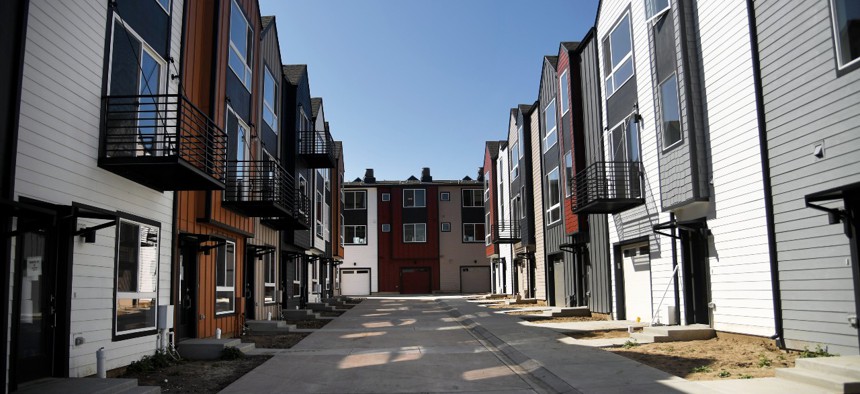Is Land-Use Reform the Missing Tool in Combating Climate Change?

A transit-oriented development near Denver that offers walkable access to public transportation for work, retail or leisure. Joe Amon/The Denver Post via Getty Images

Connecting state and local government leaders
A new report argues that rezoning for more mixed-use and transit-oriented developments could significantly reduce carbon emissions and help meet global climate goals.
If cities nationwide adopted an oft-overlooked strategy in their climate action plans, the country could avoid emitting up to 200 million tons of carbon dioxide equivalent annually into the atmosphere. That’s comparable to retiring 50 mid-sized coal plants, or about 20% of the country's remaining coal fleet.
That often forgotten strategy is land-use reform, and the policies that could help achieve those reductions include upzoning, mixed-use and transit-oriented developments.
While more frequently identified as a tool to increase affordable housing, thoughtful land-use reform could significantly reduce carbon emissions over the next few decades by reducing the number of miles people are driving, improving building efficiency and fostering environments for carbon sequestration, according to a recent report from RMI, formerly the Rocky Mountain Institute.
“We really want to elevate the importance of land-use reform as a climate strategy because it's been completely absent from just about every climate action plan in a material way,” said Ben Holland, head author of the RMI report.
While there’s been plenty of enthusiasm around getting more electric vehicles on the road, there’s been far less focus on ways to limit how much people drive—a critical action that will be necessary to keep global warming under the International Panel on Climate Change’s 1.5 degree threshold, according to Holland.
To meet global climate goals and reduce transportation emissions by 45% by the end of the decade, the United States will need to put 70 million electric vehicles on the road while also reducing the miles each person travels by 20%.
To analyze the potential for land-use reform to achieve that reduction, the study looked at three fast-growing cities: Austin, Texas; Charlotte, North Carolina; and Denver. . Researchers primarily focused on policies that would allow multifamily buildings on single-family lots, transit-oriented development and infill development—initiatives that would reduce the distances residents need to travel from their homes.
Researchers looked at population and job growth forecasts through 2040 in these cities and ran them against two future scenarios: a “business as usual” scenario that continued zoning trends centered around single-family detached homes, and an alternative scenario that involved land-use reforms.
The study found that land-use reform could reduce local travel by up to 13%, greenhouse gas emissions by up to 14% and building energy use by up to 16%, relative to the business-as-usual scenario.
The reductions are not the result of massive overhauls of existing zoning regulations, but modest changes that involve developing only 0.3% to 3.6% of parcels in each city. Building multifamily housing and focusing it near transit-rich and walkable locations, the report notes, would accommodate 50% more people in neighborhoods.
At least 70% of residential land across the country is zoned for single-family housing, so rezoning it for multifamily housing is key to reducing carbon emissions and energy and water use. Think shared walls provide better insulation, and a shared yard means less land to irrigate. Multifamily buildings are also easier to integrate with commercial spaces, meaning residents would be within walking distance of stores and services.
Building multifamily homes in city centers decreases urban sprawl as well, a costly phenomenon that typically leads to car-centric neighborhoods. Studies have found that urban sprawl costs the national economy $1 trillion annually and can increase municipal expenditures up to 40% to cover public services like transit and infrastructure.
By limiting urban sprawl, less land is consumed, meaning cities could avoid building in vulnerable areas like floodplains and protect existing forests and agricultural land. In the scenarios considered in the study, land consumption fell between 50% and 80% compared to the business-as-usual models.
Land-use reforms can be difficult to implement and measuring their impacts can be challenging, which is likely why the strategy is often excluded from climate-action conversations, Holland said. There’s also frequently strong political opposition. But having data about the effectiveness of the policies as they relate to climate change could soften some of that opposition.
“We're seeing a lot around the country at the city level, regional level and state level, a great deal of enthusiasm for enacting land-use reforms,” Holland said. “I think we’re sort of on the cusp of a number of other cities and states embracing the reality of needing to meet their housing goals as well as their climate goals through these kinds of reforms.”

NEXT STORY: Risk management through resilient technology



